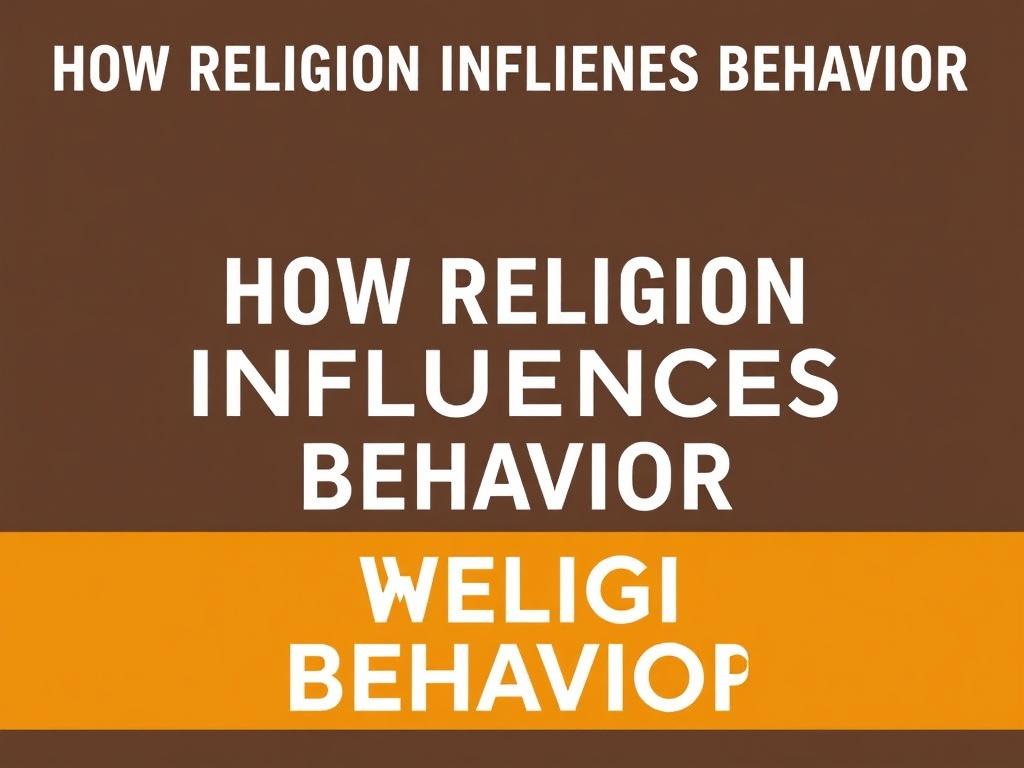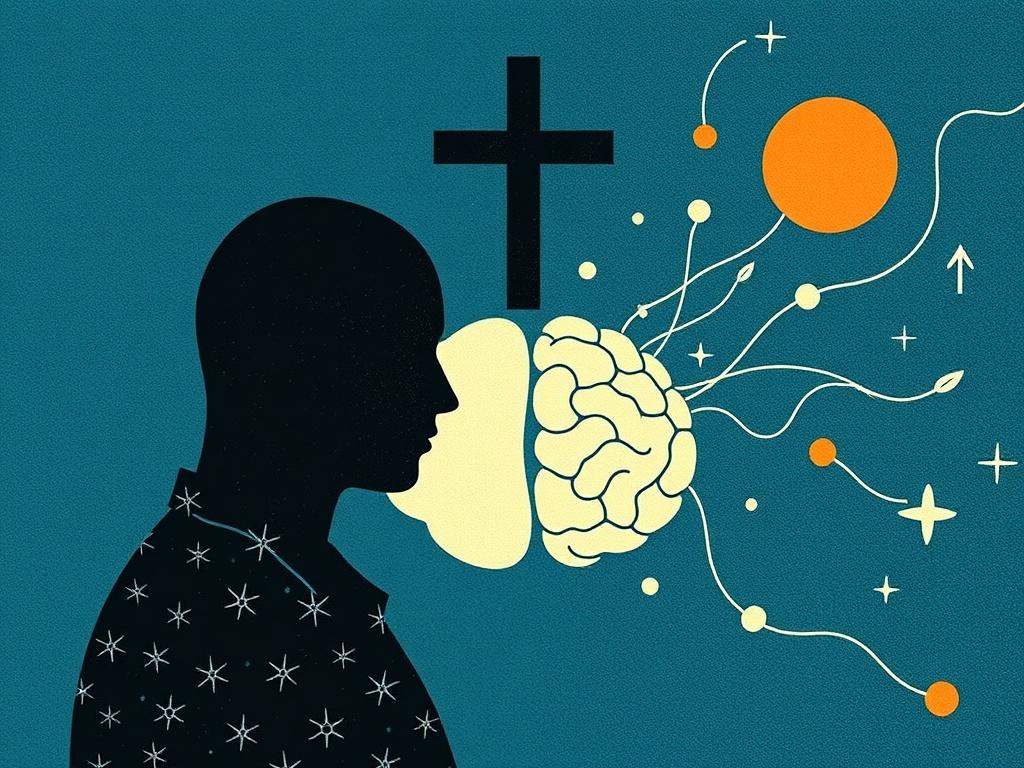Religion has played a pivotal role in shaping human behavior throughout history. From ancient rituals to modern-day worship, religious beliefs have influenced the way individuals think, make decisions, and interact with others. Understanding how religion influences behavior offers fascinating insights into the human psyche, social structures, and cultural norms. This article dives deeply into the mechanisms through which religion impacts behavior, the psychological and social aspects involved, and how different religions shape individual and collective actions.
The Foundation: What Is Religion’s Role in Human Life?

Religion, at its core, is often understood as a system of beliefs and practices centered around questions of existence, morality, and the divine. It provides guidelines for living, moral codes, and explanations about the meaning of life. These elements offer a framework within which many people find purpose and direction. Religion’s role extends beyond personal spirituality; it functions as a social glue that binds communities together and regulates behavior through shared values.
People turn to religion to understand the world around them, find comfort in times of distress, and establish a moral compass. This compass, deeply embedded in religious teachings, often dictates what is considered “right” and “wrong” behavior. For instance, religious texts such as the Bible, Quran, Bhagavad Gita, and Torah contain rules and stories that influence followers’ ethical decision-making.
How Religion Shapes Ethical and Moral Behavior
Religious teachings profoundly influence moral perspectives and ethical behavior, often more than secular philosophies. Most religions emphasize virtues such as compassion, honesty, forgiveness, and charity. These teachings tend to encourage adherents to cultivate behaviors that promote social harmony and reduce conflict.
Moral Codes in Different Religions
Different religions offer unique moral codes, but many principles overlap. Here is a simplified table illustrating some of the key moral virtues emphasized by major world religions:
| Religion | Core Moral Virtues | Behavioral Impact |
|---|---|---|
| Christianity | Love, Forgiveness, Honesty, Humility | Encourages compassion and forgiveness; stresses the importance of integrity |
| Islam | Justice, Charity, Compassion, Truthfulness | Promotes fairness and generosity toward others |
| Hinduism | Non-violence, Dharma (duty), Truth, Respect for Life | Fosters respect for all living things and ethical duty fulfillment |
| Buddhism | Compassion, Mindfulness, Non-attachment, Wisdom | Focuses on reducing suffering and cultivating mental discipline |
| Judaism | Justice, Kindness, Community Responsibility, Obedience to God’s Law | Emphasizes social justice and communal care |
These moral virtues naturally influence followers’ behavior in daily life. For example, a Christian who values forgiveness may be more likely to resolve conflicts peacefully, while a Buddhist focused on mindfulness may engage in meditation to enhance self-control and reduce harmful impulses.
The Psychological Mechanisms Behind Religion’s Influence on Behavior

Religion influences behavior not merely through external rules but also via powerful psychological mechanisms. One of these is the internalization of moral norms taught by religious communities, which becomes part of an individual’s conscience and identity.
Internalization of Moral Values
When individuals grow up in religious environments, the values espoused by their faith can become deeply rooted in their subconscious. Over time, these values guide decisions automatically. For example, an individual raised with the belief that stealing is sinful may develop an inherent aversion to dishonest behavior without needing external enforcement.
The Role of Social Identity
Religious identity is often a core component of a person’s self-concept. Belonging to a religious group can create a sense of belonging and shared purpose. People tend to conform to the moral expectations of their group because they want acceptance and fear social rejection. This social pressure reinforces positive behaviors aligned with the group’s teachings.
Fear and Hope: Motivation for Moral Conduct
Many religions use the concepts of reward and punishment—both in this life and an afterlife—to encourage compliance with moral codes. Fear of divine punishment or negative consequences and hope for spiritual reward can strongly motivate behavior. For example, the promise of heaven or nirvana may inspire followers to act kindly and avoid wrongdoing.
Religion and Prosocial Behavior: Encouraging Kindness and Charity
One of the most significant ways religion influences behavior is through the promotion of prosocial behaviors—actions intended to benefit others. Charitable giving, volunteering, and acts of kindness are often encouraged and even institutionalized within religious communities.
Examples of Religious Charitable Acts:
- Christian tithing and philanthropy
- Zakat in Islam, a mandatory form of almsgiving
- Dana (generosity) in Buddhism
- Seva (selfless service) in Sikhism
- Charitable holidays such as Diwali and Passover emphasizing family and community support
Research shows that people who are religious tend to engage more frequently in volunteering and charitable donations. This behavior is often driven both by personal belief in the moral imperative to help others and by participation in organized religious activities that create opportunities to give and serve.
Religion’s Influence on Social Behavior and Community Norms
Religion is a social institution that sets standards for appropriate behavior within communities. These norms affect how individuals relate to each other, often stressing cooperation, respect, and communal responsibility.
Religious Attendance and Social Cohesion
Regular participation in religious services facilitates community bonding and cooperation. People develop connections with others who share their beliefs, creating networks of support and accountability. These social ties can reinforce positive behavioral patterns such as law-abiding conduct, generosity, and social trust.
Religion and Social Control
Religious groups sometimes act as regulators of social behavior. By defining acceptable and unacceptable actions, religions provide informal social control that supplements legal systems. For example, dishonesty or adultery may be condemned and punished within religious communities, which discourages antisocial behavior and promotes order.
Potential Negative Impacts on Behavior
It is important to acknowledge that religion’s influence on behavior is not always positive. Sometimes, strict adherence to religious doctrine can lead to intolerance, exclusion, or even violence toward those who hold different beliefs. Religious beliefs can also conflict with modern values, such as gender equality or LGBT rights, potentially limiting individual freedoms.
Comparing Behavior in Religious and Secular Contexts

To understand how religion shapes behavior, it helps to compare religiously guided conduct with behavior in secular societies. While moral behavior is not exclusive to religious individuals, religious frameworks often provide clearer, more structured guidance and social reinforcement.
Summary of Differences:
| Aspect | Religious Context | Secular Context |
|---|---|---|
| Source of Moral Authority | Divine command or sacred texts | Reason, law, social consensus |
| Motivation for Good Behavior | Spiritual reward/punishment, community approval | Legal consequences, social norms, empathy |
| Community Influence | Strong, faith-based groups and rituals | More individualistic or diverse social groups |
| Behavioral Expectations | Defined by religious doctrine and tradition | Varies widely depending on cultural, social context |
While secular societies often promote freedom of thought and diversity, religious teachings can provide a clearer moral framework that guides followers’ behavior consistently.
Individual Behavior and Religious Experience
The personal experience of religion also plays a key role in shaping behavior. People who actively engage with their faith through prayer, meditation, or worship rituals often report a greater sense of purpose and self-control. Religious experience can foster psychological well-being and resilience, which positively influence behavior in everyday life.
Practices That Influence Behavior
- Prayer: Often promotes reflection and self-regulation
- Meditation: Enhances mindfulness, reducing impulsive behavior
- Confession or repentance: Encourages accountability and change
- Religious study: Reinforces moral learning and motivation
These practices nurture habits of mind and heart that lead to ethical conduct, patience, and empathy.
Case Studies: Religion and Behavior Across Cultures
Exploring real-world examples helps clarify how religion influences behavior in different cultural contexts.
Case Study 1: Religion and Alcohol Consumption
Religious guidelines strongly affect drinking behavior. For example, Islam prohibits alcohol, leading many Muslims to abstain entirely, shaping behavior in social and family settings. Christianity and Judaism have varied teachings, but generally promote moderation. In cultures where religion guides lifestyle, individuals’ drinking habits often mirror these religious norms.
Case Study 2: Religion and Conflict Resolution
Many faith traditions promote peace and forgiveness as pathways to resolve conflict. In some parts of Africa and the Middle East, religious leaders play crucial roles in mediating disputes and fostering reconciliation based on shared religious principles. This illustrates religion’s potential to encourage constructive behavior even in strained social environments.
Case Study 3: Religious Fasting and Self-Discipline
Fasting during Ramadan, Lent, or other holy periods cultivates self-control and spiritual growth. This temporary restraint teaches adherents about managing desires, which can generalize to other aspects of life such as temperance in speech, action, and decision-making.
The Future: How Modernity and Religion Continue to Shape Behavior
As societies evolve, so do the ways religion influences behavior. Globalization, scientific advances, and changing social norms continuously interact with traditional religious teachings. Many individuals today reinterpret religious principles to align with modern values, while others embrace secular ethics.
Technology also changes religious behavior — online worship, digital prayer groups, and virtual communities transform how people express and live their faith. Despite these shifts, the core impact of religion on human behavior—shaping values, guiding actions, and nurturing community—remains significant.
Summary of Key Ways Religion Influences Behavior
- Provides moral frameworks that shape ethical choices
- Fosters social identity and group cohesion
- Motivates prosocial actions like charity and forgiveness
- Uses psychological mechanisms to internalize values
- Influences lifestyle choices and daily habits
Conclusion
Religion’s influence on behavior is multifaceted and profound, touching on psychological, social, and ethical dimensions of human life. Whether through moral teachings, community belonging, or personal religious experience, faith shapes how people think, feel, and act. While the effects can be positive—encouraging kindness, honesty, and social responsibility—they may also vary, sometimes creating tensions with modern values or between groups. In our complex world, understanding how religion influences behavior remains essential for appreciating human diversity and fostering coexistence. Whether one is religious or secular, recognizing this deep connection enriches our awareness of why we behave the way we do and how our actions are guided by beliefs that reach far beyond ourselves.




















